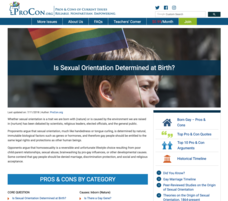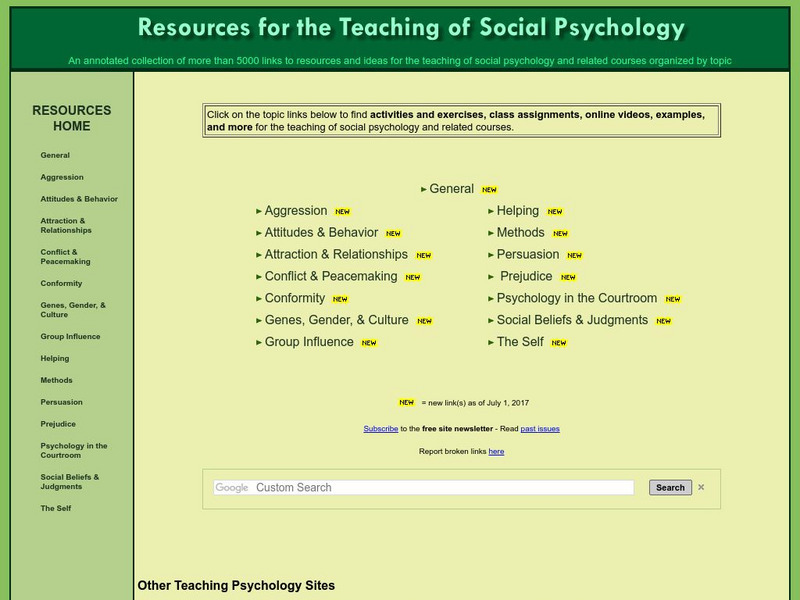Curated OER
Investigating the Harlem Renaissance
The work of Langston Hughes opens the door to research into the origin and legacy of the Harlem Renaissance and how the literature of the period can be viewed as a commentary on race relations in America. In addition, groups are assigned...
Curated OER
Exploring Learned and Innate Behavior
Students explore the differences between learned and innate behavior among humans and monkeys. They complete an assignment and read articles about two studies, which used similar test methods to show that infants and monkeys share an...
Curated OER
Born Gay
Is a person's sexual orientation determined at birth? With the informative website, scholars prepare for a debate about the topic. They learn the top pro and con arguments and read through a historical timeline of homosexuality. They...
Curated OER
World Hunger
Students research the causes and effects of world hunger on children. In this world hunger instructional activity, students discuss causes and effects of hunger around the world and research a specific area affected by hunger. Students...
Curated OER
Creating an Effective Search Statement
Learners identify how to turn a topic statement or research question into an effective search statement for use with electronic databases or web search engines. They apply use of Boolean operators in the searches.
Curated OER
Exploring Learned and Innate Behavior
Compare and contrast learned and innate behaviors between humans and primates. Your biology class members read articles and participate in discussions about the use of tools and communication methods. That's about it, you'll probably...
Curated OER
Made You Look
High schoolers spend some time in the world of marketing and advertising by analyzing and creating slogans and campaigns geared toward adolescents. Students work with a partner to create their design and share with the class
Curated OER
Dealing With Name Calling
Students define respect, examine how name-calling can affect students, and suggest ways to promote more respect in the way students deal with each other.
Curated OER
The Cost of Smoking
Students explain the financial and life expectancy costs of smoking using a computer model to enter and adjust parameters to collect data in the form of a table. They analyze the data collected and determine the true cost of smoking.
Curated OER
Desegregating the Kentucky Public School System
Students watch a video which chronicles the struggle to desegregate Kentucky's schools. They write a paper on a given aspect of what they saw in the video.
Curated OER
Health and Home Economics
Eighth graders conduct research on a topic of choice. They discuss the topics of copyrighting, plagiarism, and biblipgraphic format issues, conduct research using a variety of materials and resources, and create a poster, travel...
Other
Simply Psychology: Social Psychology: Obedience to Authority
Introduces the concept of obedience to authority and explains how it is different from conformity. Includes three downloadable articles on Stanley Milgram's famous experiments on obedience, which discuss how his research might help to...
Other
Crow: Resources for the Teaching of Social Psychology
This page provides links to several subcategories of social cognition such as prejudice, persuasion, attitudes, and altruism. Once you click on the topic you have a variety of sources to choose from for more information.
Lumen Learning
Lumen: Boundless Psychology: Social Influence
Distinguishes obedience from compliance and conformity, and looks at Stanley Milgram's obedience experiments and Philip Zimbardo's prison experiment. Factors that were found to elicit obedient behavior are listed, and the impacts these...
Lumen Learning
Lumen: Boundless Psychology: Social Influence: Group Behavior
Looks at what contributes to the formation of a group, and at three factors that influence a group's behavior, including groupthink, groupshift, and deindividuation. Includes a quiz.
CommonLit
Common Lit: "Anti Social Networks? We're Just as Cliquey Online" by Laura Sydell
A learning module that begins with "Anti-social Networks? We're Just as Cliquey Online" by Laura Sydell, accompanied by guided reading questions, assessment questions, and discussion questions. The text can be printed as a PDF or...
York University
Classics in the History of Psychology: Attitudes and Cognitive Organization
This resource provides a paper from 1946 by Fritz Heider on how attitudes of one person can influence the attitudes of others. A very basic concept put into detail.
Other
Simply Psychology: Prejudice and Discrimination
Explains what prejudice and discrimination are, with examples, and the differences between them. Also looks at how social norms may influence behavior, causing an increase in the level of prejudice.
Other
Influence by Robert B. Cialdini, ph.d.
Covers the six principles of influence: commitment, consistency, social proof, liking, authority, and scarcity.
Encyclopedia Britannica
Encyclopedia Britannica: Sociology
A very detailed look at the development of the field of sociology. Looks at its historical roots, the earliest sociologists, and explains major theories that it was based on, and theories and schools of thought that evolved from those....
Other
Simply Psychology: Social Facilitation
The concept of social facilitation is explained, and the research done by Norman Triplett in 1898 into the co-action effect. Also discusses the audience effect. These two factors influence whether someone can be influenced or inhibited...
Other
Cyber Parent: How to Grow Self Esteem in Your Child
Site offers information on several aspects of self-esteem. Talks about discipline, positive language to use, and offering choices to children. Includes response to questions from parents.




















